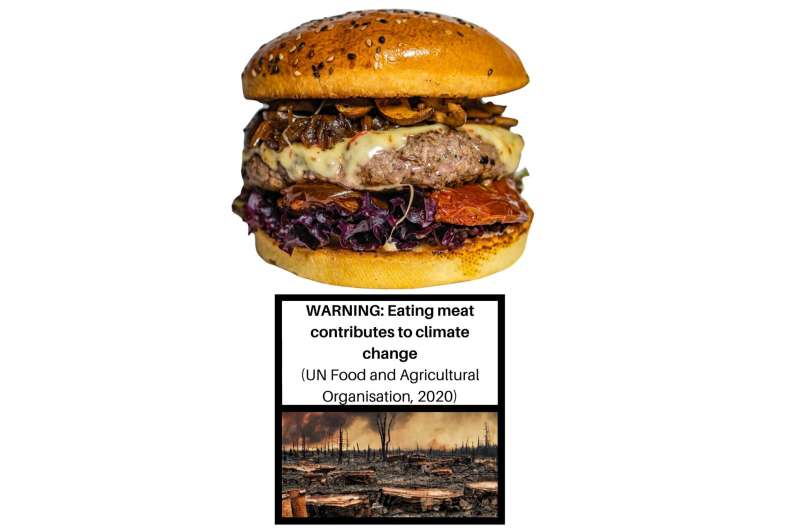This article has been reviewed according to Science X's editorial process and policies. Editors have highlighted the following attributes while ensuring the content's credibility:
fact-checked
peer-reviewed publication
trusted source
proofread
Cigarette style warning labels could reduce people's meat consumption

Cigarette-style graphic warning labels could reduce people's meat consumption, according to new research.
The study suggests the use of warning labels on meat options could improve public health and reduce the UK's carbon footprint. The team from Durham University tested a range of warning labels, including those that warn people of the damage to climate, health, and risk of pandemics. They found that all labels were effective at discouraging people from choosing meals with meat.
All warning labels, which showed a graphic image alongside text, reduced meat meal selections by 7–10%. However, participants were most in favor of the climate warning labels that they also found the most credible.
The study is published in the journal Appetite.
According to a recent YouGov poll, 72% of the UK population classify themselves as meat-eaters. The independent Climate Change Committee, which advises the UK government, recommends a 20% reduction in meat and dairy consumption by 2030.
Jack Hughes carried out the research with his supervisors as part of his Ph.D. research at the Department of Psychology at Durham University. He said, "Reaching net zero is a priority for the nation and the planet. As warning labels have already been shown to reduce smoking as well as drinking of sugary drinks and alcohol, using a warning label on meat-containing products could help us achieve this if introduced as national policy."
A representative sample of 1,001 meat-eating adults was split into four groups, and were shown pictures of hot meals that people might buy in a canteen, which contained either a health warning label, climate warning label, pandemic warning label, or no label.
They were asked to make 20 separate decisions on different meal choices, and the team also asked how anxiety-provoking and believable they found the labels. Future intentions to buy and eat the meal options, as well as how appealing the meals appeared, was measured. Participants also indicated how supportive they would be of the different labels if they were implemented as policy.
An example set of meals could be a meat pasta bake, fish pasta bake, vegetarian pasta bake and a vegan pasta bake.
Senior author on the paper, Dr. Milica Vasiljevic from Durham University's Department of Psychology, said, "We already know that eating a lot of meat, especially red and processed meat, is bad for your health and that it contributes to deaths from pollution and climate change. Adding warning labels to meat products could be one way to reduce these risks to health and the environment."
More information: Jack Hughes et al, Impact of pictorial warning labels on meat meal selection: A randomized experimental study with UK meat consumers, Appetite (2023).

















